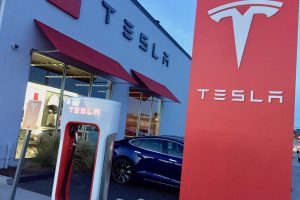- 💰 Tesla has increased wages for U.S. production workers at its factories.
- 🤝 The wage hike follows successful strikes by the United Automotive Workers (UAW) at Ford, GM, and Stellantis.
- 🚗 Non-unionized automakers like Hyundai, Honda, and Toyota also raised pay at their U.S. factories in response to UAW strikes.
- 📈 The UAW officially announced a union drive at 13 automakers with U.S. facilities, including Tesla.
- 📄 A flyer at Tesla’s Fremont factory mentioned a “market adjustment pay increase,” but specific wage details were not disclosed.
- 🗣️ UAW President Shawn Fain acknowledges Tesla’s wage increase, comparing it to other non-unionized automakers.
- ⚖️ Fain believes the wage increases at Tesla fall short of what the company can afford and what autoworkers deserve.
- 🗳️ The UAW aims to unionize Tesla in the next round of contract negotiations in 2028.
- 📈 Some argue that Tesla workers prefer company shares over union benefits, citing CEO Elon Musk’s views on unions.
- 📉 Despite UAW efforts, Elon Musk has been vocal about his skepticism towards unions and invited a union vote at Tesla’s Fremont factory in 2022.
In a recent development, Tesla has taken a significant step by increasing wages for its U.S. production workers, a move that echoes across the automotive industry’s labor landscape. Let’s delve into the details of this wage hike, the backdrop of union activities, and the broader implications for Tesla and its workforce.
Understanding Tesla’s Wage Increase
Tesla’s decision to raise wages for U.S. production workers signals a proactive approach to employee compensation. As the company continues to thrive in the electric vehicle market, ensuring fair and competitive wages is not just a financial decision but a strategic move to retain and motivate a skilled workforce.
The UAW Strikes and Ripple Effects
The wage hike at Tesla comes in the aftermath of successful strikes led by the United Automotive Workers (UAW) at major players in the automotive industry, including Ford, General Motors (GM), and Stellantis. These strikes, spanning six weeks, resulted in historic wage increases for unionized workers. The impact didn’t stop there; non-unionized automakers like Hyundai, Honda, and Toyota responded by raising pay at their U.S. factories.
Tesla’s Response to Union Activities
The UAW’s official announcement of a union drive at 13 automakers with U.S. facilities, including Tesla, adds a layer of complexity to the wage dynamics. Tesla’s response, as seen through the lens of a flyer at its Fremont factory, reveals a “market adjustment pay increase” for various production roles. However, specific details regarding the extent of the wage increase remain undisclosed.
Shawn Fain’s Perspective
Shawn Fain, the President of the UAW, acknowledges Tesla’s wage increase but expresses reservations about its adequacy. Comparing it to wage boosts at other non-unionized automakers, Fain argues that the increases “fall far short of what the companies can afford and what autoworkers are worth.” This sets the stage for a nuanced discussion about the balance between company profits and fair compensation for the workforce.
The UAW’s Vision for Tesla
Looking forward, the UAW has set its sights on unionizing Tesla during the next round of contract negotiations in 2028. This ambitious goal aligns with the UAW’s broader strategy to extend its reach to automakers like Tesla, Volkswagen, and others with U.S. facilities lacking union contracts. The road to unionization, however, is often fraught with challenges, especially when dealing with companies like Tesla.
Tesla’s Unique Compensation Landscape
One intriguing aspect of the Tesla workforce narrative is the argument that many employees may prefer company shares over union benefits. CEO Elon Musk has been vocal about his skepticism towards unions, considering them corrupt and less valuable than Tesla’s employee share program. The debate over whether shares hold more value than traditional union benefits adds a layer of complexity to the ongoing discourse.
Elon Musk’s Stance and the Future of Unionization
Elon Musk’s openness about inviting a union vote at Tesla’s Fremont factory in 2022 reflects the company’s commitment to allowing employees to voice their preferences. Musk’s skepticism toward unions, evident in his public statements, adds an interesting dimension to the ongoing dialogue about the role of unions in today’s corporate landscape.





